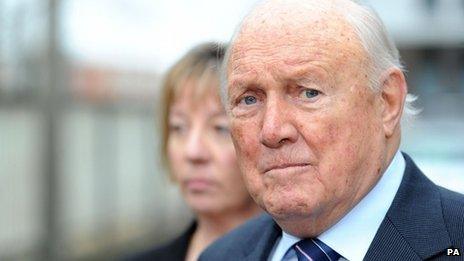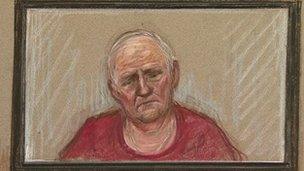Stuart Hall jail term doubled by Court of Appeal
- Published

Judges had been asked to rule on whether Hall's sentence was "unduly lenient"
Former BBC broadcaster Stuart Hall's 15-month sentence for a series of indecent assaults has been doubled by the Court of Appeal.
Increasing the term to 30 months, Lord Chief Justice Lord Judge said the original term had been "unduly lenient" given the impact on Hall's victims.
Hall, of Wilmslow, Cheshire, admitted 14 counts against girls aged from nine to 17 between 1967 and 1985 in June.
The 83-year-old's term was increased after the attorney general's appeal.
Lord Judge said some of Hall's victims had written to the court and said they were disappointed by Attorney General Dominic Grieve's decision to challenge the length of the sentence.
However, he said that Hall had "got away with it" for decades and had "lived a lie for more than half of his life".
Attorney General Dominic Grieve explains why the sentence was doubled
He added that Hall would have been seen as a "figure of power and authority and influence" by his victims and his broadcasting career had "put him in a position of trust that he was then able to exploit".
Lord Judge, Lady Justice Rafferty and Mrs Justice Macur ruled that one of the 15-month sentences Hall received for the assaults should run consecutively to the others, thereby doubling his prison term.
Hall, listening to proceedings via video link from HMP Preston, kept his head bowed and showed no reaction as the decision was announced.
The BBC's Home Affairs correspondent Danny Shaw said Hall would serve half of his 30-month sentence, which means he will be released in September 2014.
'Punished, disgraced and ruined'
Earlier, Mr Grieve had told the court that the original sentence "failed adequately to reflect the gravity of the offences and the public concern about offences of this nature".
"Even if the individual sentences for each count are appropriate given the statutory maximum available, some should have been made to run consecutively so that the total sentence passed reflected the culpability of the offender, the harm caused and [would] deter others," he said.
Crispin Aylett QC, for Hall, said the original sentence was "entirely appropriate" given the former broadcaster's age and the facts that he pleaded guilty early and that his last offence occurred 27 years ago.
He told the court: "If the object was to see this man punished, disgraced and financially ruined then all of that has been more than achieved."
Speaking after the ruling, Mr Grieve said he had asked the court to "consider the multiple offending over a prolonged period of time which involved numerous victims".
He said he had wanted the judges to take into account "breaches of trust" by Hall, as "some of these offences [were] in places where the victims were entitled to feel safe".
"He used his celebrity status to invite them to attend the BBC and he also displayed an element of planning and premeditation," he said.
Mr Grieve added that he was pleased with the increase in Hall's sentence, which "highlighted the fact that historical sexual offences are always taken very seriously and [showed] the law still applies, whoever the offender may be".
The Shadow Attorney General Emily Thornberry said Labour welcomed the decision to increase the sentence.

Stuart Hall listened to the court proceedings via video link
"We called for this review because the courts must take a consistently tough approach to sentencing child abusers," she said.
The NSPCC's David Tucker said while he understood the original sentencing, there were "good reasons to view a 15-month sentence as too short for sex crimes against children".
"We need to send a strong message that these crimes will be taken seriously even after a long passage of time as victims often find it very difficult to come forward until they are older," he said.
A spokesman for Lancashire Police said the force had received further allegations against Hall since he was jailed and were working closely with the Crown Prosecution Service (CPS) to determine the most appropriate course of action.
- Published26 July 2013
- Published6 December 2012
- Published18 June 2013
- Published17 June 2013
- Published17 June 2013
- Published17 June 2013